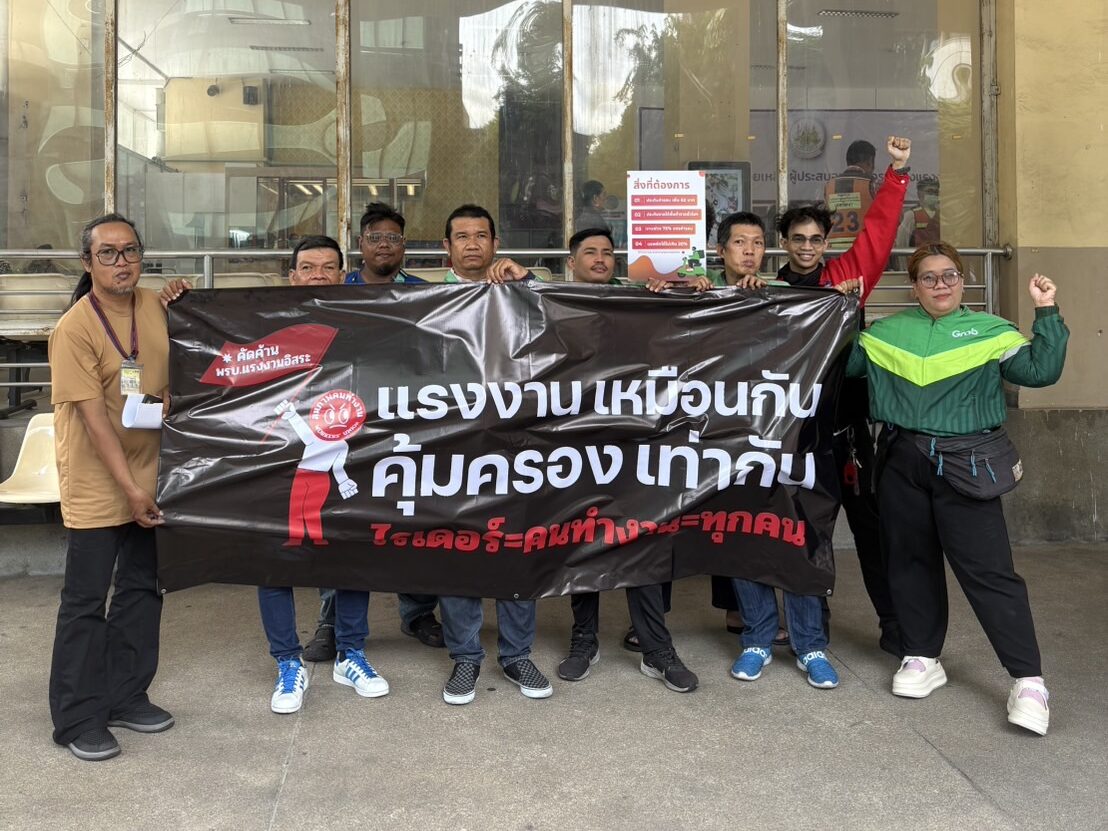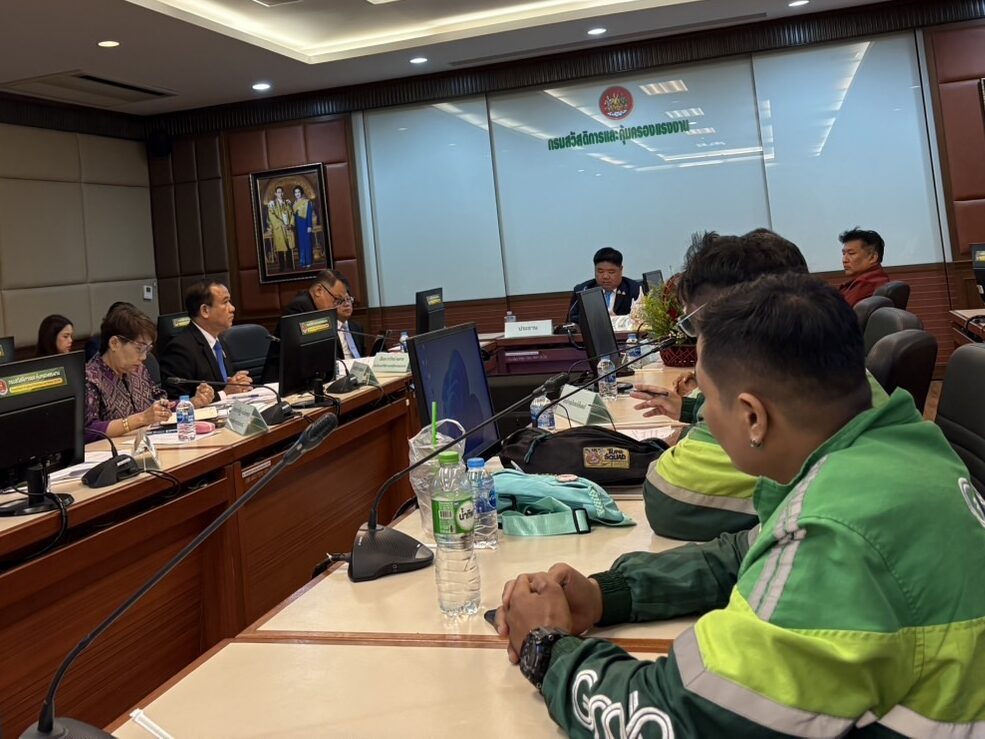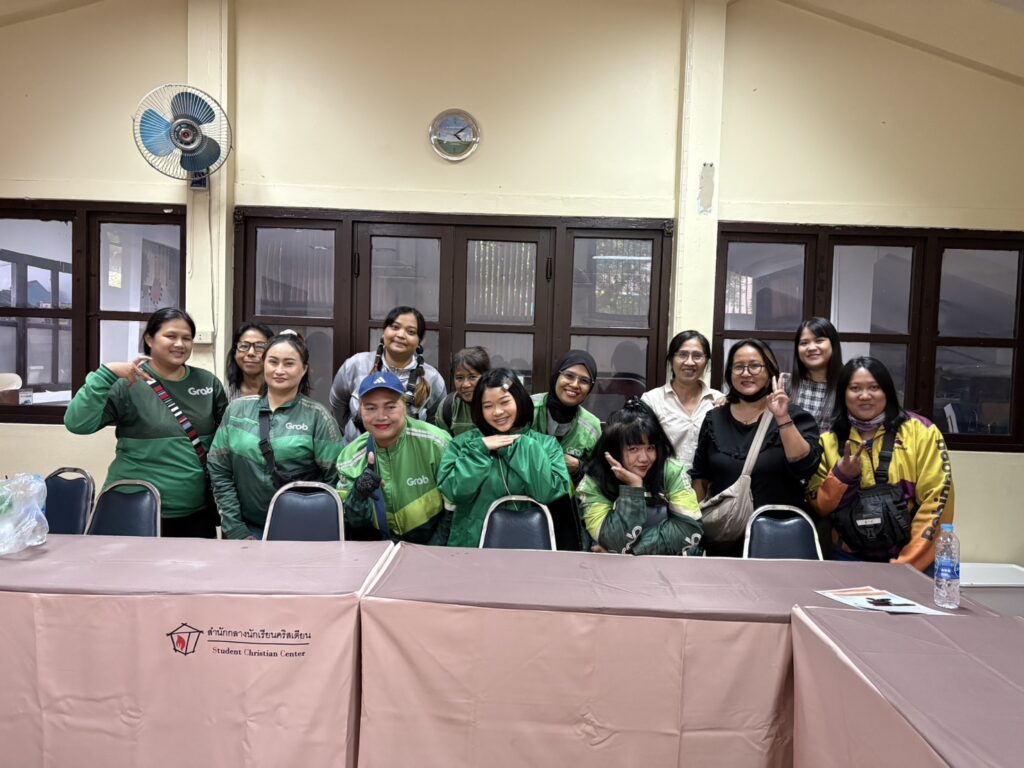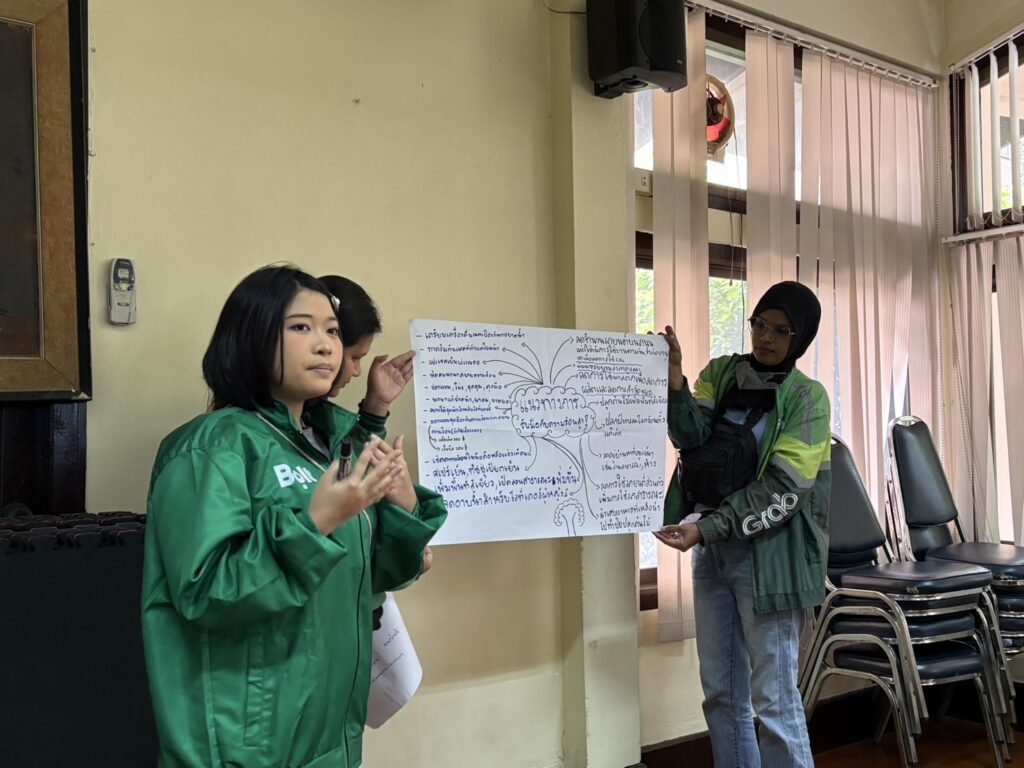(See English version below.)
สิงหาคมเป็นเดือนที่ทุกคนพูดถึง “แม่” ผ่านสีฟ้าและแคมเปญต่างๆ เพื่อเฉลิมฉลองวันแม่ในฐานะคนสำคัญ จึงเป็นช่วงเวลาอันดีที่เราจะชวนกันตระหนักถึงบทบาทของ “แม่” ในฐานะแรงงาน ทั้งงานในบ้านที่ไม่เคยถูกนับมูลค่า และงานนอกบ้านที่ต้องทำมาหากินไปพร้อมกัน เราชวนหยิบประเด็นนี้มาพูดคุยต่อกันใน Story of Impact เพื่อให้การเฉลิมฉลองวันแม่ปีนี้มีความหมายมากยิ่งขึ้น
สำหรับเดือนนี้ ในประเด็นเรื่องร่าง พ.ร.บ. ส่งเสริมและคุ้มครองแรงงานอิสระ มีความเคลื่อนไหวล่าสุดเมื่อวันที่ 15 สิงหาคมที่ผ่านมา เครือข่ายไรเดอร์ได้นำร่างดังกล่าวขึ้นโต๊ะเจรจากับรัฐมนตรีว่าการกระทรวงแรงงาน พร้อมกับนำเสนอร่างกฎกระทรวงเพื่อเป็นทางออกในการคุ้มครองไรเดอร์อย่างครอบคลุม อย่างไรก็ตาม กระทรวงแรงงานยังยืนยันเดินหน้าผลักดัน พ.ร.บ. ฉบับนี้ให้สำเร็จใน 3 เดือน แต่เปิดให้แรงงานเสนอประเด็นที่ต้องการปรับแก้ ทั้งนี้ ในวันที่ 19 สิงหาคม เครือข่ายแรงงานได้ยื่นข้อเสนอแก้ไขเพิ่มเติมพร้อมร่างกฎกระทรวงอีกครั้ง ส่วนความคืบหน้ายังคงต้องติดตามต่อไป
ขณะเดียวกัน สภาพอากาศในเดือนนี้ก็ยังน่าเป็นห่วง ทั้งความร้อนและพายุที่พัดเข้าประเทศ ยิ่งทำให้เรานึกถึงแรงงานหญิงที่เราได้แลกเปลี่ยนกันในวงสนทนาตลอดสามเดือนที่ผ่านมา ไม่ว่าจะเป็นไรเดอร์ แรงงานก่อสร้าง หรือแรงงานเกษตร ทุกคนต่างเผชิญผลกระทบโดยตรงจากทั้งแดดและฝน ผลกระทบจากสภาพอากาศเปลี่ยนแปลงจึงเป็นประเด็นที่เราต้องร่วมกันให้ความสำคัญและขับเคลื่อนไปพร้อมๆ กัน
ขอบคุณผู้อ่านทุกท่านที่ติดตามอ่านรีแคปของเราในเดือนสิงหาคม แล้วเจอกันอีกครั้งในฉบับถัดไป!
งานของเรา
เจรจา รมว. แรงงาน คัดค้านร่าง พ.ร.บ. ส่งเสริมและคุ้มครองแรงงานอิสระ


ต่อเนื่องจากความเคลื่อนไหวในการสร้างการรับรู้และทำความเข้าใจต่อร่างพระราชบัญญัติส่งเสริมและคุ้มครองแรงงานอิสระเป็นระยะเวลาหลายเดือน เมื่อวันที่ 15 สิงหาคม 2568 สถาบันแรงงานและเศรษฐกิจที่เป็นธรรม (JELI) เข้าร่วมกับสหภาพคนทำงาน กลุ่ม Rider Center และสหภาพคนทำงานแพลตฟอร์มไรเดอร์-รังสิต เข้าพบนายพงศ์กวิน จึงรุ่งเรืองกิจ รัฐมนตรีกระทรวงแรงงาน เพื่อหารือปัญหาความเดือดร้อนของไรเดอร์ รวมถึงการคัดค้านร่างพระราชบัญญัติส่งเสริมและคุ้มครองแรงงานอิสระ เครือข่ายไรเดอร์ได้ชี้แจ้งปัญหาความเดือดร้อนของไรเดอร์ โดยเฉพาะประเด็นปัญหาค่ารอบต่ำและสภาพการทำงานที่อันตรายและขาดความคุ้มครอง พร้อมทั้งยื่นร่างกฎกระทรวงที่ได้ร่างมาเป็นแนวทางให้กับกระทรวงแรงงาน และเน้นย้ำถึงข้อเรียกร้องของเครือข่ายไรเดอร์คือการให้รัฐมนตรีว่าการกระทรวงแรงงานใช้อำนาจออกกฎกระทรวงตามมาตรา 6 แห่ง พ.ร.บ. คุ้มครองแรงงาน 2541 เพื่อคุ้มครองไรเดอร์
จากการหารือ กระทรวงแรงงานโดยนายพงศ์กวินยังคงยืนยันจะผลักดันร่าง พ.ร.บ. ส่งเสริมและคุ้มครองแรงงานอิสระให้สำเร็จภายในสามเดือน โดยเสนอกำหนดกรอบเวลาให้ทั้งสองฝ่ายหารือและจัดทำข้อเสนอร่วมให้เสร็จภายในสิ้นเดือนสิงหาคมนี้ เพื่อนำไปปรับแก้ในร่าง พ.ร.บ. โดยย้ำว่ากฎหมายฉบับนี้มีเป้าหมายเพื่อคุ้มครองแรงงานนอกระบบและแพลตฟอร์มทั้งหมด แต่ในระยะเริ่มแรกจะให้การเข้าร่วมเป็นแบบสมัครใจก่อน และต่อไปจะออกกฎหมายรองเพื่อกำหนดรายละเอียดเฉพาะตามประเภทแรงงาน เช่น วินมอเตอร์ไซค์ ไรเดอร์ หรือแม่บ้าน
ล่าสุดเมื่อวันที่ 29 สิงหาคม 2568 เครือข่ายไรเดอร์ได้เดินทางไปยื่นหนังสือต่อกระทรวงแรงงานเพื่อเสนอให้แก้ไขเพิ่มเติมร่าง พ.ร.บ. ส่งเสริมและคุ้มครองแรงงานอิสระ พร้อมทั้งยื่นร่างกฎกระทรวงว่าด้วยการคุ้มครองแรงงานแพลตฟอร์มไรเดอร์ โดยมีนายสมาสภ์ ปัทมะสุคนธ์ รองปลัดกระทรวงแรงงาน เป็นผู้รับหนังสือ อย่างไรก็ตาม ขั้นตอนต่อไปยังต้องติดตามอย่างใกล้ชิด เนื่องจากในวันเดียวกัน ศาลรัฐธรรมนูญมีคำสั่งให้นางสาวแพทองธาร ชินวัตร พ้นจากตำแหน่งนายกรัฐมนตรี จากคดีคลิปเสียงเจรจากับสมเด็จฮุน เซน ประธานองคมนตรีและอดีตนายกรัฐมนตรีกัมพูชา ส่งผลให้คณะรัฐมนตรีต้องพ้นตำแหน่งทั้งคณะ จึงคาดว่าจะทำให้กระบวนการล่าช้าออกไป
ทั้งนี้ สำนักข่าวประชาไทได้รวบรวมข้อสังเกตของอาจารย์กฤษฎา ธีระโกศลพงศ์ จากคณะสังคมสงเคราะห์ศาสตร์ มหาวิทยาลัยธรรมศาสตร์ ที่ได้จากงาน “เจรจาทางสังคม: ร่าง พ.ร.บ. ส่งเสริมและคุ้มครองแรงงานอิสระกับการจ้างงานในแพลตฟอร์ม” ซึ่งจัดขึ้นโดย JELI คณะกรรมาธิการการแรงงาน สภาผู้แทนราษฎร และสหภาพคนทำงาน เมื่อวันที่ 14 พฤษภาคม ณ อาคารรัฐสภา อ่านที่นี่
แรงงานหญิงท่ามกลางวิกฤตสภาพอากาศ


ตั้งแต่เดือนมิถุนายนที่ผ่านมา สถาบันแรงงานและเศรษฐกิจที่เป็นธรรม (JELI) ร่วมกับ Climate Resilience for All จัดเวทีหารือกับกลุ่มคนงานหญิงในหลายอาชีพที่ได้รับผลกระทบโดยตรงจากสภาพอากาศที่ร้อนจัด ไม่ว่าจะเป็นไรเดอร์ คนงานภาคเกษตร และภาคก่อสร้าง เพื่อรวบรวมทั้งประสบการณ์ ตลอดระยะเวลากว่า 3 เดือน มีคนงานเข้าร่วมแลกเปลี่ยนแล้วมากกว่า 90 คน ที่ได้สะท้อนทั้งปัญหาด้านสุขภาพ สภาพการทำงาน และเศรษฐกิจ รวมถึงแนวทางการรับมือที่นำมาปรับใช้ในชีวิตประจำวันและแนวทางที่ต้องการได้รับการสนับสนุน
หลังจากสิ้นสุดกระบวนการหารือ JELI จะนำข้อมูลที่ได้จากการพูดคุยทั้งหมดมาบันทึกและสังเคราะห์เป็นรายงานเพื่อนำไปเป็นข้อเสนอเชิงนโยบาย กรณีตัวอย่าง รวมถึงคำให้การจริงของแรงงาน โดยหวังว่าข้อมูลเหล่านี้จะเป็นเครื่องมือสำคัญในการผลักดันต่อไปยังหน่วยงานภาครัฐที่เกี่ยวข้อง ทั้งในด้านแรงงาน การคุ้มครองสิทธิ ตลอดจนการจัดการสิ่งแวดล้อมและการปรับตัวต่อสภาพอากาศ
ข่าวสำคัญ
สมาคมก่อสร้างเผยแรงงานกัมพูชาทยอยกลับบ้านกว่า 3 แสนคน ทำก่อสร้างสะดุดหนัก ผู้รับเหมาร้องรัฐเร่งเจรจาเปิดทางนำเข้ากลับไทย ขณะที่ ครม. เปิดทางนำเข้าแรงงานศรีลังกา แต่ถูกกังวลค่าแรงสูงถึง 7-8 หมื่นบาท/เดือน อาจกระทบต้นทุนก่อสร้าง อ่านที่: มติชนออนไลน์
เกาหลีใต้ผลักดันแก้ไขกฎหมายแรงงานฯ สำเร็จ ขยายความหมาย “นายจ้าง” รับผิดชอบแรงงานไม่ประจำ ขยายขอบเขตข้อพิพาทแรงงานครอบคลุมการเลิกจ้าง การปรับโครงสร้าง การย้ายงาน และจำกัดความรับผิดชอบจากการนัดหยุดงาน อ่านที่: สมาพันธ์สหภาพแรงงานระหว่างประเทศ
ไทย-สหรัฐ บรรลุข้อตกลงภาษี Reciprocal Tariff กำหนดอัตราใหม่ 19% สำหรับสินค้าส่งออกจากไทย เริ่ม 7 ส.ค. 68 สินค้า Transshipment เก็บ 40% ไทยเสนอปรับลดภาษีนำเข้าสินค้าสหรัฐหลายรายการเป็น 0% พร้อมพิจารณาซื้อสินค้าเพิ่ม อ่านที่: กรุงเทพธุรกิจ
ศาลรัฐธรรมนูญวินิจฉัยให้แพทองธาร ชินวัตร พ้นจากตำแหน่งนายกรัฐมนตรี จากคดีคลิปเสียงสนทนากับฮุน เซน ประธานองคมนตรีและอดีตนายกฯ กัมพูชา ครม. และผู้ดำรงตำแหน่งทางการเมืองที่นายกฯ แต่งตั้งพ้นตำแหน่งด้วย โดยภูมิธรรม เวชยชัย ทำหน้าที่รักษาการนายกฯ จนกว่าสภาผู้แทนราษฎรจะเลือกคนใหม่ อ่านที่: CNN
เรื่องเล่ารายเดือน
“งาน” ที่ไม่มีค่าจ้างและวันหยุด
เช้าตรู่ของวันทำงาน หญิงสาวลุกขึ้นจากที่นอนเพื่อทำอาหารให้คนทั้งครอบครัว ก่อนจะพาลูกไปส่งที่โรงเรียน เสร็จแล้วจึงเปิดแอปพลิเคชันในโทรศัพท์ สตาร์ทรถจักรยานยนต์ วิ่งงานไรเดอร์ต่อจนถึงเย็น เมื่อภารกิจบนท้องถนนสิ้นสุด เธอรับลูกจากโรงเรียนกลับมาที่บ้าน แล้วยังต้องซักผ้า ทำกับข้าว เก็บกวาดห้อง สอนลูกทำการบ้าน และพาเข้านอน กว่าทุกอย่างจะเรียบร้อย เธอถึงได้มีเวลาของตัวเองเพียงเล็กน้อย แล้วเมื่อเช้าวันใหม่มาถึง วงจรชีวิตนี้ก็เริ่มต้นซ้ำอีกครั้ง
หลายคนอาจมองว่างานของเธอเริ่มและจบตรงที่สตาร์ทรถรับงาน แต่ความจริงคือ “งาน” ของเธอเริ่มตั้งแต่ตื่นนอนและแทบไม่เคยสิ้นสุดในแต่ละวัน งานเหล่านี้ไม่มีใครจ่ายค่าจ้างให้ แต่กลับเป็นงานที่ขาดไม่ได้
ทุกเดือนสิงหาคม เรามักเฉลิมฉลอง “วันแม่” ด้วยคำบอกรักและพวงมาลัยดอกมะลิ แต่เบื้องหลังชีวิตประจำวันของแม่จำนวนมากกลับเต็มไปด้วยงานที่ไม่เคยถูกนับและไม่เคยได้หยุดพัก ทั้งการทำงานรับค่าจ้างนอกบ้าน และการทำงานดูแลในบ้าน ตั้งแต่เลี้ยงลูก ดูแลครอบครัว ไปจนถึงดูแลผู้สูงอายุ สิ่งเหล่านี้คือ “reproductive labor” งานเพื่อการดำรงอยู่ งานที่ทำให้สังคมเดินต่อได้ แต่ไม่เคยได้รับการยอมรับว่าเป็นงานที่มีคุณค่าทางเศรษฐกิจ
นอกจากคำบอกรักแม่แล้ว เรามาเริ่มฉลองวันแม่ด้วยการตั้งคำถามต่อสังคมว่า ประเทศของเราได้ลงทุนอย่างจริงจังในสถาบันการดูแลที่มีความจำเป็นหรือไม่ ไม่ว่าจะเป็นระบบสาธารณสุข ศูนย์เลี้ยงเด็ก หรือการดูแลผู้สูงอายุ ครอบครัวส่วนใหญ่ต้องรับภาระค่าใช้จ่ายเอง ขณะที่คนทำงานดูแลซึ่งล้วยแล้วแต่เป็นผู้หญิงเกือบทั้งหมดกลับได้รับค่าจ้างที่ต่ำเตี้ยเรี่ยดินทั้งในภาครัฐและเอกชน
เมื่อวันที่ 8 มีนาคม 2568 ที่ผ่านมา เครือข่ายผู้หญิง องค์กรคนทำงาน และเครือข่ายเด็ก ได้ร่วมกันแถลงข้อเรียกร้องต่อรัฐบาลในวาระวันสตรีสากล เรียกร้องให้มีการผลักดันสิทธิและสวัสดิการพื้นฐานที่แม่และครอบครัวพึงมี เช่น เงินอุดหนุนเด็กเล็กถ้วนหน้าเดือนละ 600 บาท เงินอุดหนุนหญิงมีครรภ์ตั้งแต่เดือนที่ห้าถึงเดือนที่เก้า เดือนละ 3,000 บาท ตลอดจนเบี้ยยังชีพผู้สูงอายุและคนพิการเดือนละ 1,000 บาทแบบถ้วนหน้าด็กให้ได้รับการปกป้อง คุ้มครอง และพัฒนาอย่างเหมาะสม เพราะการคลอดบุตรไม่ใช่เรื่องของแม่คนเดียว เหมือนคำกล่าวที่ว่า “เลี้ยงเด็กหนึ่งคน ใช้คนทั้งหมู่บ้าน” หากเราหวังจะสร้างสังคมที่เป็นธรรม สังคมนั้นก็ควรเริ่มต้นตั้งแต่วันแรกของชีวิต
ร้องยังมุ่งไปที่การขยายสิทธิในระบบประกันสังคมให้ครอบคลุมแรงงานทุกกลุ่ม โดยเสนอให้แม่มีสิทธิลาคลอดและเลี้ยงดูบุตรไม่น้อยกว่า 180 วันพร้อมค่าจ้างเต็ม และให้พ่อมีสิทธิการลาร่วมดูแลบุตรอย่างน้อย 30 วัน เพื่อสร้างสมดุลในครอบครัว ไม่ผลักงานดูแลทั้งหมดให้ผู้หญิงเพียงฝ่ายเดียว นอกจากนี้ยังเรียกร้องให้แรงงานที่ถูกกันออกจากความคุ้มครองมายาวนาน เช่น ลูกจ้างทำงานบ้าน แรงงานนอกระบบ ไรเดอร์ และแรงงานแพลตฟอร์ม ได้รับสิทธิประกันสังคมและกองทุนเงินทดแทนเช่นเดียวกับแรงงานในระบบ
นอกจากสิทธิแรงงานแล้ว ข้อเรียกร้องยังผลักดันให้มีสถานเลี้ยงเด็กเล็กตั้งแต่อายุหกเดือนถึงสามปีที่มีคุณภาพและปลอดภัย เพื่อให้แม่สามารถกลับเข้าสู่ตลาดแรงงานได้จริง รวมถึงการปกป้องสิทธิแรงงานข้ามชาติ คนทำงานบริการทางเพศ กลุ่มชาติพันธุ์ และคนพิการ ซึ่งล้วนถูกทิ้งไว้ข้างหลังในระบบสวัสดิการของไทยมาอย่างยาวนาน
สิ่งสำคัญคือรัฐบาลไทยต้องเร่งให้สัตยาบันอนุสัญญา ILO ฉบับที่ 183 ว่าด้วยการคุ้มครองสิทธิความเป็นมารดาตามหลักสากล เพื่อให้แม่ในประเทศไทยได้รับความคุ้มครองตามมาตรฐานสากล รวมถึงการจัดงบประมาณที่คำนึงถึงเพศ เชื้อชาติ อายุ และความพิการ และต้องกระจายสู่ท้องถิ่นอย่างน้อย 35% ภายในปี 2569
ในทุกปีที่วันแม่เวียนมานั้นจึงเป็นการย้ำเตือนถึงการก้าวไปสู่การสร้างสังคมที่แม่ทุกคนมีสิทธิพื้นฐานที่มั่นคง ได้รับการคุ้มครองจากการเลิกจ้าง มีเวลาสำหรับเลี้ยงลูกด้วยนมแม่ให้ครบหกเดือน มีศูนย์เลี้ยงเด็กที่เข้าถึงได้จริง และให้สังคมเห็นคุณค่าของงานที่ไม่มีวันหยุดนี้ เพื่อปูรากฐานไปสู่สังคมที่มีความยุติธรรมต่อไป
อ้างอิง
- เครือข่ายผู้หญิง องค์กรคนทำงาน และเครือข่ายเด็ก. (2568). แถลงการณ์ในวาระวันสตรีสากล 8 มีนาคม 2568: นโยบายเศรษฐกิจและสังคมของรัฐ ต้องไม่ทิ้งผู้หญิงและเด็กไว้ข้างหลัง. t.ly/tcbS8
August is the month when Thai society turns its attention to “mothers,” with campaigns celebrating their importance. It’s also a moment to recognize that mothers are workers, both at home and outside. In this month’s Story of Impact, we bring this issue forward to make our celebration of Mother’s Day more meaningful.
This month, JELI continues to follow updates on the Draft Independent Workers Promotion and Protection Bill. On August 15, rider networks presented a proposed ministerial regulation to the Minister of Labor aimed at securing protections for riders. The negotiations ended without agreement. While the Minister has insisted on pushing the bill forward, political turbulence following the Prime Minister’s dismissal may delay the process, leaving its future uncertain and in need of continued attention.
At the same time, the mix of extreme heat and storms this month recalls the women workers we have spoken with, whose lives and livelihoods are directly affected by both sun and rain. Climate pressures affect everyone, but they weigh most heavily on workers without protection, and this will remain part of our work ahead.
Thank you for reading along with us. We’ll keep sharing what’s ahead in the next edition!
JELI’s Work This Month
Rider Networks Oppose Draft Independent Workers Promotion and Protection Bill in Talks with the Minister of Labor


Following months of efforts to raise awareness on the Draft Independent Workers Promotion and Protection Bill, JELI joined the Workers’ Union, Rider Center, and the Rangsit Platform Riders Union in a meeting with Minister of Labor Pongkawin Jungrungruangkit on August 15. The groups presented riders’ concerns, including opposition to the draft bill. They also submitted a draft ministerial regulation as an alternative pathway, urging the Minister to use his authority under Section 6 of the Labor Protection Act (1998) to immediately issue a regulation for rider protections.
In response, Minister Pongkawin reaffirmed his intention to push the draft bill forward within three months. He proposed that both sides work together to develop joint recommendations by the end of August, which could then be incorporated into the bill. The Ministry stressed that the draft is designed to extend protection to all informal and platform workers, though participation would initially be voluntary. Supplementary regulations would later be introduced to address the specific needs of worker groups such as motorcycle taxi drivers, riders, and domestic workers.
Most recently, on August 29, the rider networks returned to the Ministry of Labor to submit another petition calling for amendments to the draft bill, along with a revised draft ministerial regulation on rider protections. However, the next steps remain uncertain, as on the same day the Constitutional Court dismissed Prime Minister Paetongtarn Shinawatra from office over a leaked audio case involving talks with Hun Sen, head of the Privy Council and former Prime Minister of Cambodia. As a result, the entire Cabinet was dismissed, which is expected to delay the legislative process.
For a deeper look at this bill, Prachatai has published key observations by Assoc. Prof. Dr. Kritsada Theerakosonphong of the Faculty of Social Administration, Thammasat University. His insights were drawn from the forum “Social Dialogue: The Draft Independent Workers Promotion and Protection Bill and Platform Employment”, co-organized by JELI, the Committee on Labor of the House of Representatives, and the Workers’ Union at the Thai Parliament on May 14. Read more here.
Women Workers in the Climate Crisis


Since June, JELI, in collaboration with Climate Resilience for All, has been holding dialogues with groups of women workers in various sectors directly affected by extreme heat, delivery riders, agricultural workers, and construction workers. Over the past three months, more than 90 workers have joined these discussions, sharing their experiences of health risks, unsafe working conditions, and economic challenges, as well as the coping strategies they use in daily life and the kinds of support they need.
When the discussion process concludes, JELI will document and synthesize all the findings into a report, including policy recommendations, case studies, and workers’ testimonies. This information will serve as a tool to push for change with government agencies responsible for labor, rights protection, environmental management, and climate adaptation.
Important News
The Construction Association reports that over 300,000 Cambodian workers have returned home, disrupting the industry. Contractors urge their return, while the Cabinet’s approval to bring in Sri Lankan workers has raised concerns over high wages. Read more: Matichon Online
South Korea’s unions won historic labour law reforms: prime contractors must bargain with non-regular workers, labour disputes now include layoffs and restructuring, and employers face limits on suing unions for strike damages. Read more: International Trade Union Confederation
Thailand and the US have reached a Reciprocal Tariff agreement, setting a new 19% rate on Thai exports, and 40% on transshipment goods. Thailand also proposed reducing import tariffs on several U.S. products to 0% and considering increased purchases. Read more: BangkokBizNews
Political Shock in Thailand as Constitutional Court dismissed Prime Minister Paetongtarn Shinawatra from office over a leaked conversation with Cambodia’s former PM Hun Sen, forcing the entire Cabinet to step down. Read more: CNN
Story of impact
“Work” With No Pay and No Days Offs
At dawn, a woman rises to prepare breakfast for her family before taking her child to school. When she returns, she opens a delivery app on her phone, starts her motorcycle, and rides through the city until evening. Later, she picks her child up from school, cooks dinner, does the laundry, and puts her child to bed. By the time she has a moment for herself, it is nearly midnight, only for the cycle to begin again the next morning.
Many may think her work begins and ends when she switches on the delivery app. In truth, her “work” starts the moment she wakes and rarely ends. These are tasks no one pays her for, yet they are indispensable.
Every August, Mother’s Day in Thailand is celebrated on the 12th and throughout the month with words of love, gifts, and jasmine garlands. Yet behind these gestures, the daily lives of mothers are filled with work that is invisible and unending: wage-earning jobs outside the home and care work inside it, from raising children to looking after the household and the elderly. This is reproductive labor, the everyday work that keeps families and society going but is still rarely seen as real labor with economic value.
Mother’s Day should also prompt a deeper question: has our country truly invested in the care society needs? Healthcare, childcare, and eldercare still fall on families, while care workers, most of them women, remain underpaid. On International Women’s Day 2025, women’s groups and labor networks called on the government to expand basic welfare. Their proposals included a universal child allowance of 600 baht per month, a maternity grant of 3,000 baht from the fifth to ninth month of pregnancy, as well as a universal living allowance of 1,000 baht per month for the elderly and persons with disabilities.
he demands call for expanding social security to all workers, granting mothers 180 days of fully paid maternity leave and fathers 30 days of paternity leave to share caregiving. They also seek equal protection for groups long excluded from Thailand’s welfare system, including domestic workers, informal workers, delivery riders, and platform workers, ensuring access to benefits and the Workmen’s Compensation Fund.
The statement further urges the government to establish safe and quality childcare centers for children aged six months to three years, enabling mothers to return to the workforce with real support. It also calls for stronger protection of the rights of migrant workers, sex workers, ethnic minorities, and persons with disabilities, all of whom are consistently left behind.
Crucially, the Thai government must ratify ILO Convention No. 183 on Maternity Protection to meet international standards, and ensure budgets reflect gender, ethnicity, age, and disability, with at least 35% allocated to local governments by 2026.
Mother’s Day should be about more than words. Honoring mothers means guaranteeing secure rights, protection from dismissal, time to care for their children, and access to reliable childcare, laying the groundwork for a fairer society.
References
- Statement on International Women’s Day, March 8, 2025, by the Women, Workers, and Children’s Networks: “State Economic Policies: Leaving Working Women and Children Behind.” t.ly/tcbS8
